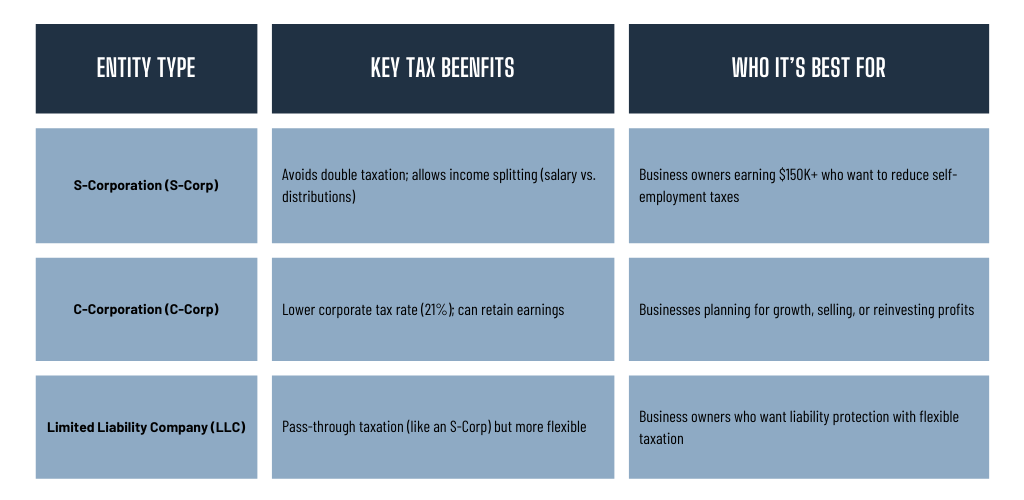As a high-net-worth business owner or investor, you’ve built something valuable. But every April, the reality sets in: Taxes are one of your biggest expenses.
The ultra-wealthy don’t just accept high tax bills—they plan proactively to help minimize them. Tax-efficient wealth structuring, strategic income deferrals, and asset protection planning can mean the difference between keeping your wealth working for you or losing it to the IRS.
At Finley Davis Private Wealth, we work with business owners, multi-generational families, and ultra-high-net-worth investors to design tax strategies that help protect and sustain their wealth. Because in the world of wealth, what you keep matters more than what you make.
1. Business Entity Structure: The Foundation of Tax Efficiency
How your business is structured determines how much you pay in taxes. Yet, many business owners default to the wrong entity structure, costing them thousands (or even millions) in avoidable taxes.
S-Corp, C-Corp, or LLC? Choosing the Right Structure:

Example: A private manufacturing business owner generating $12M annually restructures from an LLC to a C-Corp to take advantage of the 21% corporate tax rate. By implementing an executive benefits package and structured dividend payouts, they defer $4M of taxable income—helping reduce their personal tax liability by approximately $1.6M per year.
Are You Optimized for 2025?
A mid-year entity restructuring could help create significant tax efficiencies over the next decade.
2. The Power of Deferred Compensation in Helping Reduce Taxable Income
For high earners, deferring income can be one of the most powerful tax-saving tools. Why? Because shifting income to lower-tax years or retirement allows you to reduce your immediate tax burden while securing long-term financial benefits.
Key Deferred Compensation Strategies
Non-Qualified Deferred Compensation (NQDC) Plans – Allows executives and business owners to defer income into future years, often at lower tax rates.
Cash Balance Pension Plans – Enables contributions far beyond 401(k) limits, helping reduce taxable income while compounding assets.
Private Placement Life Insurance (PPLI) & Premium Financing – Converts highly taxed investment income into tax-advantaged growth inside a life insurance structure.
Example: A real estate developer with $15M in annual earnings implements a PPLI strategy, deferring $5M of investment gains annually into a tax-efficient insurance structure. Over 15 years, this approach can help generate significant tax-deferred growth, helping to protect wealth from income and estate taxation.
Why It Matters: Ultra-HNW tax planning isn’t just about reducing today’s tax bill—it’s about strategically positioning assets for future opportunities.
3. Asset Protection Strategies That Also Provide Tax Advantages
High-net-worth families face two major risks: excessive taxation and potential lawsuits. The right strategies can mitigate both.
Tax-Advantaged Asset Protection Structures
Irrevocable Trusts – Shift assets out of your taxable estate, help reduce liability exposure, and control how wealth is distributed.
Family Limited Partnerships (FLPs) & Grantor Retained Annuity Trusts (GRATs) – Transfer assets to heirs at discounted tax values while retaining control.
Dynasty Trusts – Helps preserve wealth for multiple generations, with assets compounding outside the estate indefinitely.
Example: A privately held business owner with a $500M net worth moves a portion of their company shares into a GRAT, locking in today’s lower valuation while transferring significant wealth to heirs at a reduced estate tax cost. This strategy can help create potential savings of nearly $120M in estate taxes over multiple generations.
Why This Matters: True wealth isn’t just about accumulation—it’s about long-term preservation and efficient transfer.
The More You Plan, The Less You Pay—Let’s Strategize for 2025
Smart investors don’t wait until tax season—they plan ahead to help reduce tax liabilities and protect generational wealth.
At Finley Davis Private Wealth, we collaborate with tax attorneys, CPAs, and estate planners to develop customized tax strategies designed for ultra-high-net-worth clients.
—-
Past performance is no guarantee of future results. Personnel of RiskBridge Advisors, LLC (“RiskBridge”) prepared this material. The views expressed herein do not constitute research, investment advice, or trade recommendations. RiskBridge may, from time to time, participate or invest in transactions with issuers of securities that participate in the markets referred to herein, perform services for or solicit business from such issuers, and/or have a position or effect transactions in the securities or derivatives thereof.
This material is distributed for informational purposes only. All material presented is compiled from sources believed to be reliable, but accuracy cannot be guaranteed, and RiskBridge makes no representation as to its accuracy or completeness. Any opinions, recommendations, and assumptions included in this material are based upon current market conditions, reflect the judgment of RiskBridge as of the date indicated, and are subject to change without notice. You acknowledge and agree that RiskBridge is not obligated to provide any additional information or update such information in making the information available. Securities and/or indices highlighted or discussed in this communication are mentioned for illustrative purposes only and should not be construed as investment recommendations. All investments involve risk, including the loss of principal. Before implementing any strategy, consult with a qualified financial adviser and/or tax professional. This information is not intended to provide investment, tax, or legal advice, and this material is not to be relied upon in substitution for the exercise of independent judgment. This material is not to be reproduced, in whole or part, without the written consent of RiskBridge.
Tax and legal services are not provided by Lion Street Financial, LLC, and Lion Street Advisor, LLC.
